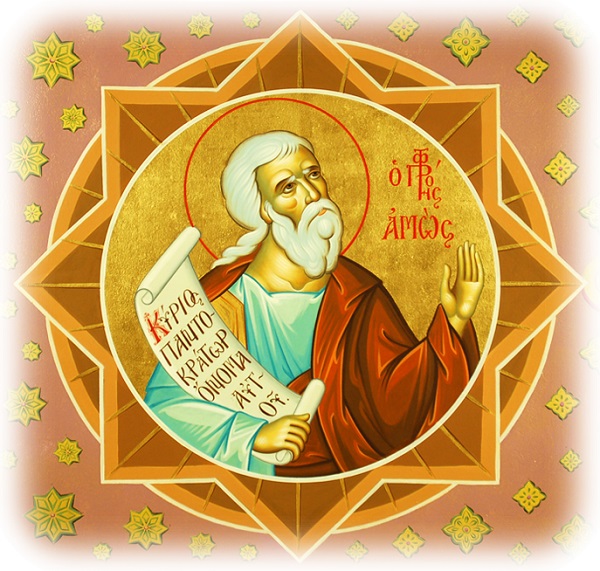Prophet Amos (15 June)

The Holy Prophet Amos, the third of the Twelve Minor Prophets,1 lived during the eighth century before Christ. He was from Judah, and was born at Tekoah in the land of Zebulon, six miles south of Bethlehem.
At that time, the Hebrew nation was divided into two Kingdoms: Judah in the south, and Israel in the north. King Uzziah ruled in Jerusalem, but the other ten tribes of Israel were ruled by Jeroboam II, who was an idolater. At Bethel he set up an idol in the shape of a golden calf, which the people worshipped, turning away from the true God.
Simple and uneducated, yet fervent in his faith and zealous for the glory of God, this former shepherd of sheep and goats, and dresser of sycamore trees (Amos 7:14-15) was chosen by the Lord for prophetic service. He was sent to the Kingdom of Israel to denounce King Jeroboam’s impiety, as well as that of the Israelites. The Prophet predicted great misfortunes which would befall Israel because of its ungodliness. As a result of his denunciations, Amos repeatedly endured beatings and torture.
Amaziah, the chief priest of the royal sanctuary at Bethel, hated Amos, who predicted that the Gentiles would conquer Israel; that they will slay the King, as well as Amaziah’s children; that Amaziah’s wife would become a harlot; and that Amaziah himself would die in a pagan land, because he led the people into adultery with idols (7:17). Amaziah became furious and had Amos beaten, but all of these prophecies were fulfilled.
According to a later tradition, Uzziah, the son of Amaziah, struck the Prophet Amos with a club, seriously wounding him. He was taken to his native village of Tekoah in Judah, and died there after two days (circa 787 B.C.) He should not be confused with Amoz, the father of the Prophet Isaiah.
In iconography Amos is depicted as an old man with a pointed beard. His scroll reads: It is he who builds his ascent up to Heaven (Amos 9:6).
1 The terms major and minor Prophets refer to the length of their books, not to their individual prominence. Although Amos is ranked third, his prophecy was the first to be recorded.
The Prophet Amos was from the city of Thekoue of the land of Zabulon. He was an unlearned man, a shepherd of goats and sheep, as he testifies concerning himself (Amos 7:14-15). He began to prophesy two years before the earthquake, which some say took place in the twenty-fifth year of the reign of Ozias, King of Judah, about the year 785 B.C. (Amos 1:1). Later, however, Amasias, the false priest of Bethel, brought about his death. His book of prophecy, divided into nine chapters, is ranked third among the minor Prophets. This Amos is different from the Prophet Esaias’ father, who also was called Amos. His name means “bearer of burdens.
Amos was born in the village of Thecua near Bethlehem. Being of simple origin and life. Amos was a swine herdsman for a wealthy man of Jerusalem. But God, Who does not regard a person by his outward appearance but rather by the purity of his heart, and Who took both Moses and David from their sheep and appointed them leaders of the people, chose this Amos as one of His prophets. Amos rebuked King Uzziah and his pagan priests for idolatry and dissuaded the people from worshipping the golden calves in Bethel, teaching them to worship the One Living God. When the chief pagan priest, Amaziah, persecuted Amos, he prophesied that the Assyrians would conquer Israel, that they would slay the king and the sons of Amaziah, and that the Assyrian soldiers would defile Amaziah’s wife before his eyes because he had led the people into adultery with idols. All of this later came to pass. The son of the pagan priest struck the prophet on the forehead with his staff so forcefully that Amos fell down. Barely alive, Amos was brought to his village of Thecua, where he surrendered his holy soul to God. Amos lived in the eighth century before Christ.
Apolytikion of Prophet Amos
Second Tone
As we celebrate the memory of Thy Prophet Amos, O Lord, through him we beseech Thee to save our souls.
Source: oca.org / goarch.org / westserbdio.org




